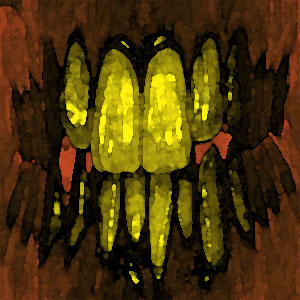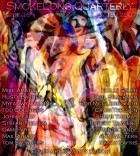How did you go from Walt Whitman’s “there swells and jets a heart” to this story?
The line is from “I Sing the Body Electric” and the way it happened was one of those crazy things. I do a timed and prompt-based writing session every Saturday night, or nearly every Saturday night, and the prompt happened to be a single word: Whitman. I didn’t know where to go with it, so I furiously Googled until I found some Whitman that resonated, and I found this specific line, and then I found the narrator just waiting for me, and I banged the story out in about a half hour, headlong and excitedly. I kicked it around in revisions thinking it might expand, but every time I went back to the original rush of words. I finally left it alone.
Clearly, we at SLQ love Rusty Barnes. Well, at least his writing. How would you describe a “Rusty Barnes” story? Also, I had the sincere pleasure of hearing you read this story at the AWP conference in Atlanta. Fantastic job. What’s the key to translating your writing to a “performance”?
What, you don’t love me, just my work? There goes my reason for writing.
As for a Rusty Barnes story, I have my obsessions, which are pretty clear: sex, violence, relationships both familial and romantic. I like to think my stories have a certain rhythm to the language, the clank and steam of the sentences, but that’s just what I hope for. I don’t know how to answer this question well.
I don’t think of reading as a performance generally. I just get up and read. I’m not ever going to be the kind of guy who blows you away at a reading. I’m not quick on my feet with a clever quip for hecklers or a keen comedic sense of timing. I make sure I take time to breathe. This story was a bit of a challenge because the lines are longer than most stories and if I’m getting the rhythms right I’m almost always at the edge of my breath, which is tough to sustain. Good thing the story is short.
Your reading was part of the Emerson alumni’s Brevity and Echo reading, an anthology from Rose Metal Press. What did Emerson mean to you as both a writer and publisher?
The Emerson connection has meant a great deal to me as a publisher, in that there is a wide market of Emerson grads willing to help one another and associate merely because of that connection, which is great, and how things are supposed to work.
As a writer, that’s difficult to say. My first workshop leader, Christopher Tilghman, validated my being there when I was about to leave after the first semester, and DeWitt Henry served as mentor for the second half of my life there, but most of my real growth as a writer came afterward. I was in too much of a hurry to get the degree, and so found myself at 24 with an MFA and teaching experience, but not all that much to write about, so it took me quite a few years to get to publishing. Once on the publishing path, though, I found I could look back and see things of value in my degree process that I hadn’t noticed during the time I’d originally spent there.
Time for, yep you guessed it, the Night Train update.
Night Train is in the midst of making the transition from print to online journal, and we’ll have a new website and submissions process up very soon, though I can’t predict exactly when yet. But soon.
At the recent AWP conference, a number of writers talked about their old flames, books that have influenced them during a formative time in their lives—and ones they return to for lessons in writing and, of course, life. Discuss your old flame, both what it meant to you then and what it means to you now.
I talk a lot about this, but Big Bad Love by Larry Brown influenced me a great deal. My wife found it for me in the bargain rack at a K-Mart in the early 90s, and I remain a fan even today. It was the first book in which I could really see people like mine. I identified with it and its people, and the writing, and the humor in it. The book still means a great deal to me in that I return to it for affirmation of what I like to do in stories and what I like to read.



 The core workshop of SmokeLong Fitness is all in writing, so you can take part from anywhere at anytime. We are excited about creating a supportive, consistent and structured environment for flash writers to work on their craft in a community. We are thrilled and proud to say that our workshop participants have won, placed, or been listed in every major flash competition. Community works.
The core workshop of SmokeLong Fitness is all in writing, so you can take part from anywhere at anytime. We are excited about creating a supportive, consistent and structured environment for flash writers to work on their craft in a community. We are thrilled and proud to say that our workshop participants have won, placed, or been listed in every major flash competition. Community works.